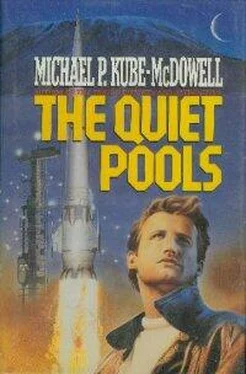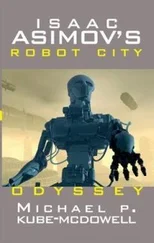“How much does a city cost?” Sasaki replied.
“Excuse me?”
“Before I answer, I want to know that you’ll have something appropriate to compare it to. How much is invested in a modern community of ten or fifteen or twenty thousand? Draw a circle around one and tell me. How much in their roads, their businesses, their homes? How much in their play yards and factories? Don’t draw the circle too small—”
Attagirl,” Donovan said, sitting forward and beaming.
“—don’t leave out the land that grows their food, the quarries and mines and wells that supply their stone and water and steel. How much for the endless maintenance to keep what you’ve built whole? How do you value the man-years of unpriced labor? How much did it cost to bring it all together? How much has it cost to keep it alive?”
“Not a billion dollars a person.”
“That’s your figure, not mine,” Sasaki said. “How much, Mr. Minor? Everything that goes into Memphis has a price tag, because it’s all being done at once, by one organization. I know what building this city cost. But that number would mean nothing to you or to the audience, because you don’t know the value of what you’ve inherited yourselves.”
If she said more, neither Donovan nor Dryke heard it. There was a buzzing sound, which Dryke later decided sounded like electric butterfly wings. The four-cell display seemed to collapse toward its center, then stabilized with a new image: a red-haired, bearded man perhaps forty years old.
“Of course you know what Memphis costs,” said the image. “A good thief always knows the value of what he steals—”
“Yes,” Dryke said approvingly. “There you are.”
“What the hell is that?” Donovan demanded, brow wrinkling.
Dryke walked forward a step and studied the face. “Not what, Mr. Donovan. Who.”
“And who is—”
“Jeremiah.”
Recovering quickly from his surprise, Donovan scrutinized the display. “Any chance that’s what he really looks like?”
“Not much.”
“I thought not,” Donovan said, then looked quizzically at Dryke. “Ah—shouldn’t you be doing something?”
Dryke shook his head. “It’s being done.”
There was confusion in the outer room. The monitor at hand still showed Sasaki’s face, but Minor was on his feet and demanding explanations for something he had heard through his earpiece.
“Are we on or off? Off? How—then give it to me here, goddammit, so I can see what’s going on.”
The image of a gentle-eyed bearded man replaced Sasaki’s puzzled expression on the monitor.
“Sound,” barked Minor. “I want sound.”
“—it is arrogance, arrogance in the service of imperialism, which forgives such plundering,” the man was saying. “They want, and so they take. They call their wants needs and justify their greed with necessity—”
“Jammed? From where? Are you sure this isn’t their doing?” Minor demanded. “No—who? Are you sure?” He stared at the monitor. “Jesus,” he said, turning to his crew. “Let’s go back live.”
“Nothing’s getting through,” the engineer protested.
“Do it,” Minor snarled.
“—what do they want? More, always more. For those who are empty inside, there is no such word as enough. Never enough power, never enough wealth—”
The engineer shrugged. “On three. But you’re talking to yourself. Three—two—one—”
Minor looked into the lens. “Jeremiah? Jeremiah, this is Julian Minor of Newstime . Can you hear me?”
“—never enough to satisfy the unsatisfiable need.” Then he paused. “Yes, Julian,” he said. “I can hear you.”
“You’re Jeremiah, leader of the Homeworld?”
“I am Jeremiah,” said the pirate.
“Would you answer a few questions?”
The bearded man nodded. “Ask your questions.”
“Some have called you the John Muir of the Earth. You use an Old Testament prophet’s name—a reluctant prophet with a flair for theater and an uncompromising message of danger and destruction. Do you see yourself as an oracle for the twenty-first century—”
“I am not important. Ask another question.”
Minor blinked in surprise. “Very well. Jeremiah, why do you oppose the Diaspora?”
“It is those who support it, not those who oppose it, who must explain themselves,” said Jeremiah. “Ask Hiroko Sasaki to explain. Explain by what right you squander your inheritance, the Earth. Explain what you have bought at such a dear price. The choking summers. The burning forests. The rising oceans. The killing rays of the Sun. You have trampled the Earth underfoot in your headlong rush to the stars.”
Sasaki held her head high as she answered. “We are all collaborators in that crime. Not Hiroko Sasaki alone. Not Allied Transcon. But I, and you, Jeremiah, and you, Julian Minor, and each of those listening, and ten generations dead and departed. The Amazon forest was burning, the river poisoned by mercury, long before Allied began to build at Prainha. The Earth was warming, the ozone vanishing, when starships were only engineers’ dreams.”
The Starlink technician was shaking his head. “No,” he said. “It’s not going through.”
“What?”
“He doesn’t want an answer,” Sasaki said quitely. “He only wants an audience.”
“Jeremiah, this is Julian Minor again. I still have Director Sasaki here, on camera just as I am. Are you stopping her answers from being heard? Are you afraid of what she might say?”
“Hiroko Sasaki is programmed with lies,” said Jeremiah. “She is abducting ten thousand of our brightest and best to send on a modern Children’s Crusade. What can she say that we can believe?”
Minor looked to Sasaki. “What about that, Director? Have you taken a look at what the effects of giving up that many people of that quality might be? From a human resources standpoint, it seems that Jeremiah has a reasonable case.”
“Jeremiah controls the airwaves. What point is there in answering?”
“We’re recording here,” Minor said. “If we have to, we’ll put it together and rebroadcast it later. Director Sasaki, one way or another, I promise you that your answers will be heard.”
She frowned, looked to the floor as she marshaled her thoughts, then up at the camera. “The pioneers are a select group of very special people,” she said. “They have to be, to face and triumph over the challenges ahead. But they’ve chosen this for themselves, earned it for themselves. No one is being abducted. Thousands more would join them if there was only room.
“Even so, Memphis won’t be leaving the Earth poorer. The Diaspora Project has been the single greatest stimulus to education and self-development since the invention of the computer. It’s motivated people of three generations across every continent to say, ‘I want to contribute,’ and work to better themselves. Most of those people, and all of that human capital, will remain here.”
Minor turned back to his camera. “Jeremiah, you can’t dispute the fact that millions worldwide bought options for the Diaspora Project. The pioneers are volunteers, the lucky few. Why not let them go? Why is it important to you to stop them?”
“It is important to all of us,” Jeremiah said. “We need what they represent. We need their will and energy here. There is so much work left to do, so much damage to repair. We need to focus on stewardship, not starships. Otherwise this endless expansionism will exhaust us and leave us empty. We have a choice between living in the Sun and dying in the dark. We must raise our voices. We must reclaim the choice from the corporations and their collaborators. It is our future.”
Читать дальше

![Nick Cracknell - The Quiet Apocalypse [= Island Zero]](/books/28041/nick-cracknell-the-quiet-apocalypse-island-zero-thumb.webp)










